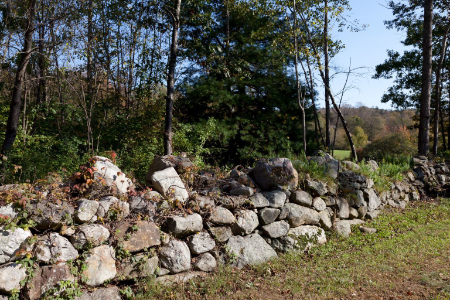Learning from the Source: Do Good Fences Make Good Neighbors?
Overview
By pairing primary sources with poetry, students consider the proverb, “Good fences make good neighbors” in the context of their own lives as well as in a local, national or global context.
Lesson Steps
Display the primary source image and analyze it together as a class using the Library of Congress Primary Source Analysis Tool.
After, ask students to consider and discuss the mood and tone of the image and what feelings it brings to mind.
Ask for two student volunteers to read this excerpt from a dialogue between New Marlborough, Massachusetts neighbors Wade Van Dore and Mrs. Cruickshank documented in 1939 as part of the Federal Writers’ Project Folklore Project.
Mr. Van Dore: “Now I’m going to play a record made by a friend of ours. You’ve heard “a speak of him before – Robert Frost, the farmer-poet. Several records have been made of his poems. This is his own voice reading them. You listen and tell me if you don’t like them. This one is called “Mending Wall.’“ I sat where I could watch her face. The poet’s voice came forth, full, resonant, firm, and distinct. At the words “Good fences make good neighbors” my friend’s thin, worn face lighted in a smile of recognition.
Mrs. Cruickshank: “My father used to say that!” she cried, and then listened again. When the poems were ended she spoke again. “Why, that sounds more like the kind of talking anybody does, except that it’s better talk,” she said wonderingly. “It’s not like the poetry we had to learn in school. I like this better. It’s something I know a little bit about.”
“I’m sure Jim over here would be a better neighbor to you if he would fence his rows in, wouldn’t he?” she went on. “I noticed, coming through your garden, the holes. Were his cows in here during the wet weather?”
Mr. Van Dore: “Yes, they were. I guess they just turned them loose and let them go where they liked. Does he always do that?”
Mrs. Cruickshank: “As long as I’ve known him, and that’s thirty-odd years. Mrs. Sheldon says he’s plum discouraged about makin’ a garden this year. Every single summer Jim’s cows get into it.”
Then play this video displaying the text of Robert Frost’s “Mending Wall” as he recites his poem and encourage students to jot down their initial impressions of it.
Divide students into small groups and distribute paper copies or provide digital access to “Mending Wall”. Direct groups to respond to the following questions as they complete a close read of the poem together.
- Note any particular striking word choices or phrasings. How do these help contribute to the tone and/or meaning of the poem?
- What questions does Frost ask in the poem both literally and figuratively?
- What can you tell about how Frost feels about mending the wall? What makes you say that?
- What larger themes does the poem raise?
Discuss student’s insights.
Distribute paper copies or provide digital access to the this letter written by Maine middle school Caroline George to Robert Frost about “Mending Wall” as part of the 2010 Letters About Literature program as well as this brief excerpt (see below) from p. 69 of Proverbs: A Handbook by Wolfgang Mieder. Instruct groups to read these texts and discuss the issues raised in the letter and the questions raised in the excerpt.
There is an inherent ambiguity in the proverb “Good fences make good neighbors” that stems from the fact that its metaphor contains both the phenomenon of fencing someone or something in while at the same time fencing the person or thing out. This being the case, it is only natural to ask such questions as: When and why do good fences make good neighbors?, Whan and why should we build a fence or wall in the first place?, and When and why should we tear such a structure down? In other words, the proverb contains within itself the tension between boundary and openness, between demarcation and common space, between individuality and collectivity, and between many other conflicting attitudes that separate people from each other, be it as neighbors in a village or city or as nations on the international scene.
Direct students to use what they learned to either write their own letter to Robert Frost about his poem “Mending Wall” and its effect on them individually or to write a poem in response to one or more of the questions posed by Frost in the poem and/or by Mieder in the excerpt from his book.

